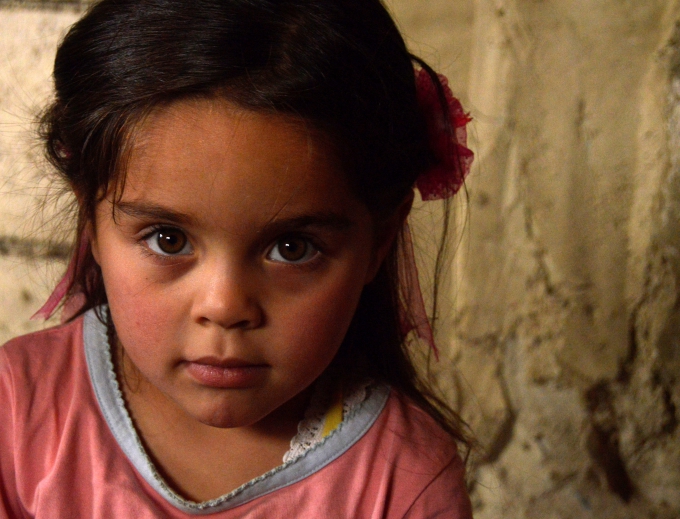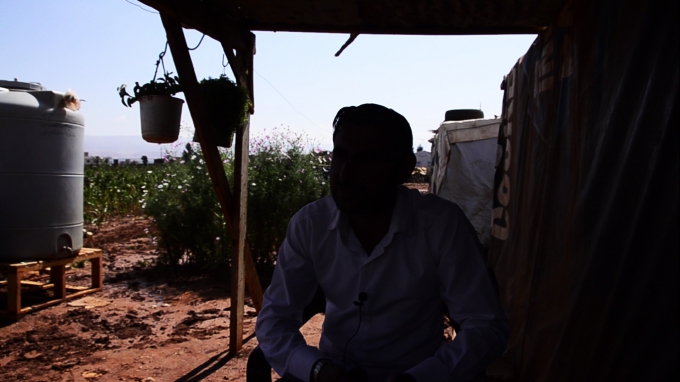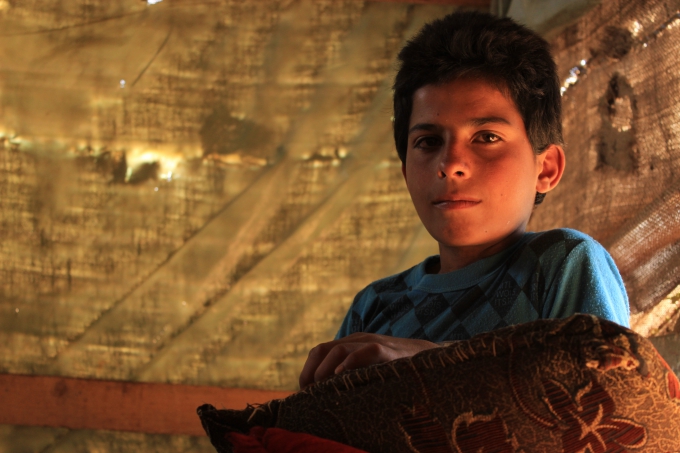Four Faces on the Fourth Anniversary of the Syrian Crisis
Four years on the war in Syria has left hundreds of thousands of children homeless, without any education or even without adequate food and nutrition essential for their lives and growth. The following four stories reflect the plight of Syrian refugee children in Lebanon.
Salem carries potatoes instead of books
Thirteen year old Salem wakes up every morning around five and gets in the back of a very crowded truck filled with women and children. The truck takes Salem to a potato field where he is given huge bags that he attaches to his waist. Salem is then expected to harvest no less than thirty bags worth of potatoes. “We have to be really fast and we mustn’t leave a single potato behind or else we get beaten with a plastic hose”, he says, holding back his tears, “each bag weighs around ten kilos when full and I now have a constant backache.”
Salem’s father, Abu Salem, had to flee Syria with his family after facing death several times. He suffers from a nerve disorder, which has gone untreated because he cannot afford medical assistance. After arriving in Lebanon, Abu Salem reluctantly sent his wife and two of his children to work in the fields in order to pay the rent for their makeshift home in an informal settlement and ensure the family’s survival.
Syrian male adults and youth find it hard to find work in Lebanon. In a country, whose economy is in crisis, many employers often prefer employing children to adults because they can be easier to control and are paid a fraction of the standard daily wage for manual labor. In many cases, refugee parents who lack any financial resources send their children to work in order to ensure the family meet their basic needs.
Salem, works under very harsh conditions and faces emotional and physical abuse at work for a mere four dollars a day. In Syria, he reached the third grade, but had to quit school to support his family when they arrived in Lebanon.
“It feels like a dagger stabbing me in the heart every morning I send the children to work instead of taking them to school” says Abu Salem desperately, “when they get back in the afternoon exhausted, hungry and sometimes crying, I think about what their future will look like and what they must think of their father”.
Lebanon, a tiny country with a population of just over 4 million, hosts the highest number of Syrian refugees of any country in the region, with 1.12 million registered Only 20 per cent of Syrian refugee children are enrolled in schools and an estimated 1 in 10 are working, causing a visible rise in child labor in the country.
Lama couldn’t play in her dark and leaking house before Save the Children’s rehabilitation works

"It was so dark in here before; I couldn't play with anyone because I couldn't see them", says Lama. PHOTO: Anastacia Al Hajj/ Save the Children
Lama is a four year old girl who fled the war in Syria with her family two years ago to take refuge in Lebanon. When they first arrived, the family of three joined their relatives who were living in an unfinished house in Akkar in the North. The thirteen children living within the mold ridden and humid walls were facing increased health risks due to their unprotected exposure to the relentless rain, snow and wind brought by Lebanon’s harsh winters.
Like thousands of other refugee families who live in makeshift buildings, Lama’s family was living in a house that has no windows, doors, kitchen or bathroom. “The roof leaked all the time, and my daughter was always sick; we were sleeping on damp mattresses and enduring freezing temperatures” says Fatima, Lama’s mother. “I didn’t know if we were going to survive.”
As part of its shelter programme, Save the Children provides a rehabilitation scheme to families living in unfinished houses. Families receive a conditional cash grant to upgrade their shelters by installing windows, doors, bathrooms and kitchens; as well as setting up electricity and water pipes. This is given in exchange for a twelve month period of secure tenure and a rental reduction negotiated with the landlord.
“We were paying rent to sleep on mud” says Fatima. “If Save the Children hadn’t supported us by installing windows and doors, I don’t think our children would have survived the three snowstorms that this winter has brought so far.”
“My best friend is my cousin Sami” four year old Lama said behind a mischievous smile. “He always hugs me when I hear the thunder.”
Lama loves to play with her thirteen cousins who live in the same house, especially after the rehabilitation, “It was so dark in here before; I couldn’t play with anyone because I couldn’t see them. Now, we play with our Lego and stuffed toys all the time.”
Doha became able to feed her family despite tough circumstances

"I was ready to offer myself to anyone who would host and feed my children", says Doha. PHOTO: Ahmad Baroudi/ Save the Children
Doha and Elham, a Syrian and Lebanese woman who have built a friendship and a business together, are two of the 800 women benefiting from the Home Based Skills Development (HBSD) programme which is being implemented by Save the Children in Lebanon’s Akkar and Bekaa governorates. The project brings together vulnerable women from refugee and host communities, and assists them in learning trades and establishing small businesses together.
Doha is a mother of five who fled the war in Syria with her family. After her husband disappeared, she was left with five children, one of whom is disabled and needs special care. She had no money or income to even afford the very basic needs like food or shelter, so the landowner threw her out of the tent she was living in.
“I was desperate and hopeless” she says. “I took my children and wandered around, trying to find another tented settlement. At that moment I was ready to offer myself to anyone who would host and feed my children”.
A Lebanese man coincidently offered his garage for a few weeks and told her about Save the Children’s HBSD programme where she joined the ‘sewing group’ and met Elham, a Lebanese widow struggling to pay for her daughters’ education.
“During the workshop and training I met lots of Syrian refugee women” says Elham. “I used to see them but never had the chance to talk to them and get to know them and learn about their worries and concerns. We quickly became friends”.
After developing a friendship with Doha, Elham helped her find a small garage close to her house to rent. The business they both established became popular in their community and the money they are earning enables Elham to continue her daughters’ education and Doha to provide the basic needs for her family.
Maher fears that an entire generation gets lost due to illiteracy

"We are losing an entire generation to illiteracy; we are jeopardizing the future of these kids, and the future of the whole region" says Maher. PHOTO: Ahmad Baroudi/ Save the Children
Maher was a teacher in Syria before the constant shelling on his town forced him to flee to Lebanon. He has been living in an informal settlement for three years and has been doing his best to teach a fraction of the one-hundred and seventy children in the area that have been stripped from their right to education.
The only education programme that has been implemented in the area was four years ago and had stopped after only four months. “There are ten year old children here who don’t know how to read and write”, says Maher as he shakes his head. “We are losing an entire generation to illiteracy; we are jeopardizing the future of these kids, and the future of the whole region.”
Maher calls for a change in the current situation. “Children’s daily activities are restricted to running around in the mud” he Maher. “They need a new environment, a safe, learning environment.”
Maher has been tutoring some children in hopes that a school will open in the informal settlement soon. He explains that the lack of any education project in the area has caused critical issues aside from illiteracy. Children are contracting hygiene related diseases from playing in the dirt all day, especially as clean water is not available. Furthermore, children are taking their energy out on their parents all the time; parents are under enough pressure to exercise patient parenting skills. All of this affects the child and the community. “What crimes did these children commit to deserve living a life without education?”
 Lebanon
Lebanon 